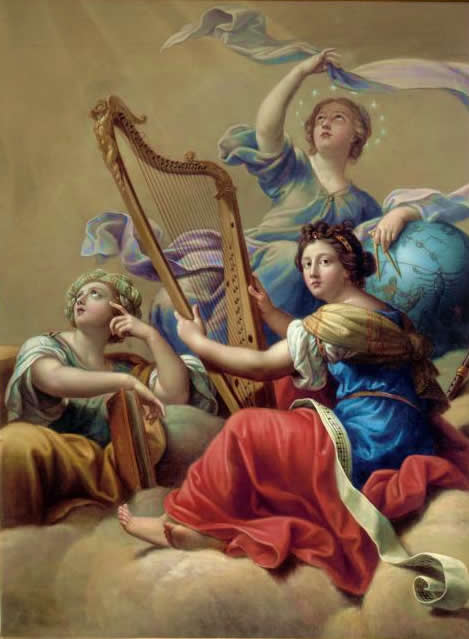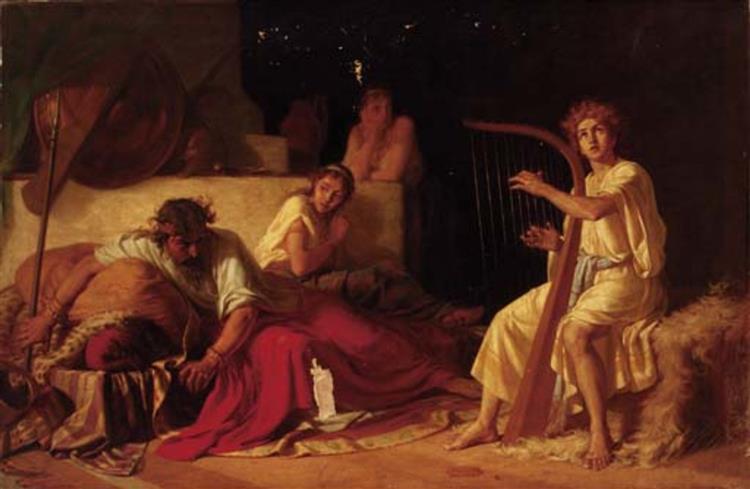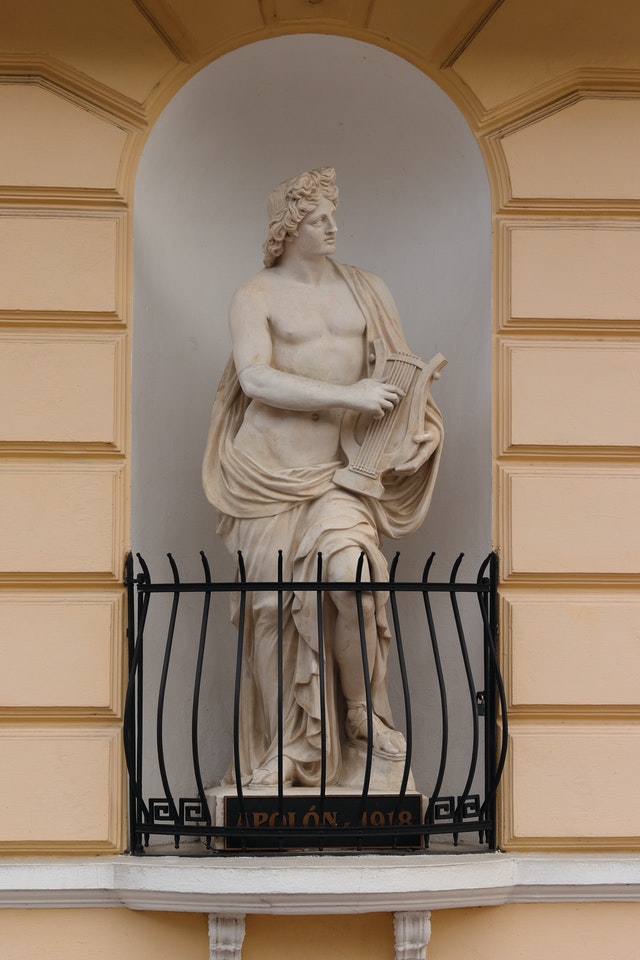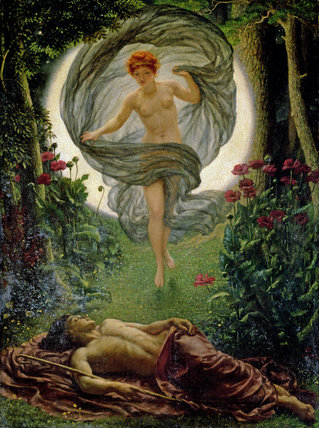Diana's Sky - Harp Music
The lyre, a hap's cousin, is an attribute of her twin brother, Appollo.
Yet rather than making this page beaming with his glorious sunlight,
I chose to ask her to accommodate its heavenly sounds in the serenity of the night sky, which I figured would be more suitable.

Painting by Pierre Mignard "Calliope, Urania and Terpsichore " (1650)

The harp is my favourite instrument, so I wanted to create a page for it.
Especially before bedtime, it is a nice music to play while you rest.
You could even feel your heart harden like a stone after a long day liberated and lighten like a cloud in a beautiful starry sky.
I chose a couple of videos which feature the harp only, since orchestra music with other instruments can be partying and quite restless!
|
|
So I bet the hymns are familiar to many Christians. I like how every simple sound feels like gentle drops of rain in the desert. |
|---|
When I searched paintings of David playing the harp for Saul, I found it quite impressive how almost all the artists are good at depicting how depressed Saul is... Seriously, it is almost like they couldn't help sympathising how great Saul's depression was. It goes to show people's deep understanding of that particular mental state and it's no joke, isn't it?

Painting by Ivan Tvorozhnikov(1848-1919) "David Playing the Harp before Saul"
Alarm bell rings if you are looking like Saul in this picture. Seeking help is vital even if you are not a king.
So, how can we all be deprived of heart energy like that? In his case, I reckon he was too busy trying to control what he could not control... and noticing how the harpist, David, in contrast, is often portrayed as someone capable of listing to the messages from heaven by playing the instrument, may tell us being the "interpreter" is about knowing what comes naturally while being yourself as opposed to labeling/branding yourself, which helps you lead your own path.
Indeed, what I like about harp music is it feels like storytelling. Stories being told with grace by the stars watching over us, blessing us with the sense of gratitude and comfort ,bringing peace of mind to us.

Statue of Apollo | Diana, aka Artemis is a chaste huntress, a goodness of wilderness, the Moon, childbirth, virginity and fertility. I somehow keep thinking if Steo were one of 12 Greek gods, he'd be Appollo, a god of music who is usually calm, but goes out of his mind every now and then (but hey, that is the case for all of the 12! )...mostly due to his talent in singing, dancing and radiant smile! The harp music below by the American harpist of Anglo-Welsh background, Carol Thompson, is another marvellous collection of heavenly sounds, many of which resemble jolly country music on the guitar. |
|
|
00:00 irish harp music (1984) 43:08 the enchanted isles (1988) 1:32:36 carolan's welcome (1992) 2:07:36 the peacock's feather (1996) 2:56:12 the blossom and the rain (1999) |
Speaking of music, its instruments and such, Steo video below is one of my favourites, as it shows how good a tour guide he is. You'd want him to guide you through all kinds of fun activities like this one:)
The National Centre for Popular Music, opened as a part of Britain's Millennium Commission project, was barely one year old when shut down in 2000 due to the unpopularity despite its name. Its legacy is carried on to British Music Experience opened in 2009, now located in Liverpool. At a glance, it has its entire focus on the British brands, but seeing how the official YT channel posts Boyzone music video, the Irish boy band history may have something to offer there.
I do believe the concept is not bad at all. Letting kids experience what their moms and dads were growing up with, giving an idea what it is like to be (successful) musicians, can be inspirational enough, even if the artists are not necessarily princes and princesses from the fantasy worlds.
Lastly, let me introduce Carpenters' poetic and imaginative piece called Crescent Noon and the poem by John Keats, which is based on Diana's myth.
The tunes are rather depressive, but that doesn't destroy the music itself, as it even adds up to its beauty in a mystical way. It's a deep song rich in awe-inspiring wonders. Many fans seem to resonate with this song, calling this one of their best, and I agree.
|
"Crescent Noon" written by John Bettis, Richard Carpenter/From the album "Close to You" (1970)
|
Green September
Burned to October brown Bare November Led to December's frozen ground The seasons stumbled round Our drifting lives are bound To a falling crescent noon Feather clouds cry A vale of tears to earth Morning breaks and No one sees The quiet mountain birth Dressed in a brand new day The sun is on its way To a falling crescent noon Somewhere in A fairytale forest lies one Answer that is waiting To be heard You and I were Born like the breaking day All our seasons All our green Septembers Burn away Slowly we'll fade into A sea of midnight blue And a falling crescent noon |
There seems to be both positive and negative interpretations of the song out there. Mine is pretty neutral, though it seems to be telling us that something important is missing in people's lives; how our worldviews can be distorted by not being in harmony with our surroundings.
It catches the calmness of the changing seasons, the beauty of which often go unnoticed due to its subtleness and its repetitiveness. The sadness hidden in its exquisiteness can be explained by the chances that could have been created by accepting and embracing things as they are, by trying to listen to the unspoken.
This music gives me ample visions of the beauty of great nature, and here, I got a sample of it below. Although this does have some typical survival themes for nature films portrayed mostly through bear family life, its essence still basically is a pretty celebration of the lives in the wilderness themselves, safe for kids and pleasant enough for those who are ready to go to bed soon.
Let me end Diana's tale by citing the excerpt of Endymion by John Keats, an English Romantic poet.
The entire poem can be found at:John Keats.com
A thing of beauty is a joy for ever:
Its loveliness increases; it will never
Pass into nothingness; but still will keep
A bower quiet for us, and a sleep
Full of sweet dreams, and health,
And quiet breathing.
Therefore, on every morrow, are we wreathing
A flowery band to bind us to the earth,
Spite of despondence, of the inhuman dearth
Of noble natures, of the gloomy days,
Of all the unhealthy and o'er-darkened ways
Made for our searching: yes, in spite of all,
Some shape of beauty moves away the pall
From our dark spirits. Such the sun, the moon,
Trees old and young, sprouting a shady boon
For simple sheep; and such are daffodils
With the green world they live in; and clear rills
That for themselves a cooling covert make
'Gainst the hot season; the mid forest brake,
Rich with a sprinkling of fair musk-rose blooms:
And such too is the grandeur of the dooms
We have imagined for the mighty dead;
All lovely tales that we have heard or read:
An endless fountain of immortal drink,
Pouring unto us from the heaven's brink.
Nor do we merely feel these essences
For one short hour; no, even as the trees
That whisper round a temple become soon
Dear as the temple's self, so does the moon,
The passion poesy, glories infinite,
Haunt us till they become a cheering light
Unto our souls, and bound to us so fast,
That, whether there be shine, or gloom o'ercast;
They always must be with us, or we die.
Therefore, 'tis with full happiness that I
Will trace the story of Endymion.
The very music of the name has gone
Into my being, and each pleasant scene
Is growing fresh before me as the green
Of our own valleys: so I will begin
Now while I cannot hear the city's din;
Now while the early budders are just new,
And run in mazes of the youngest hue
About old forests; while the willow trails
Its delicate amber; and the dairy pails
Bring home increase of milk. And, as the year
Grows lush in juicy stalks, I'll smoothly steer
My little boat, for many quiet hours,
With streams that deepen freshly into bowers.
Many and many a verse I hope to write,
Before the daisies, vermeil rimm'd and white,
Hide in deep herbage; and ere yet the bees
Hum about globes of clover and sweet peas,
I must be near the middle of my story.
O may no wintry season, bare and hoary,
See it half finish'd: but let Autumn bold,
With universal tinge of sober gold,
Be all about me when I make an end.
And now, at once adventuresome, I send
My herald thought into a wilderness:
There let its trumpet blow, and quickly dress
My uncertain path with green, that I may speed
Easily onward, thorough flowers and weed.

Painting by Edward Poynter "The Visions of Endymion" (1902)
The myth that is supposed to explain a new moon in a lunar cycle.
It's when Diana leaves the sky
to meet Endymion, who is under the spell to sleep for good so that he can maintain his beauty and youth.
Keats has turned the story into the romance between the two, in which Endymion ventures into the underworld, the sky, and the sea to seek the love he met in his dream. He finds the true love through his mortality, which he, in the end, accepts with his courage and gracefulness, the strength that can be described by the word Keats created, "negative capability". (A good, concise article on the term "negative capability" can be found here. Last retrieved July2022)
Sweet dreams!
Love, Nolla
Leave a Comment
This page's URL: ""
Photo by Jaroslav:
Photo by Just Another Photography Dude:
Image edited by Nolla
